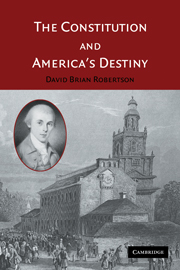Book contents
- Frontmatter
- Contents
- List of Tables and Figures
- Preface
- Acknowledgments
- List of Abbreviations
- 1 Politics and the Constitution
- 2 The Policy Crisis of the 1780s
- 3 James Madison's Plan for the Constitutional Convention
- 4 The Political Landscape of the Constitutional Convention
- 5 Who Governs? Constituting Policy Agency
- 6 What Can Be Governed? Constituting Policy Authority
- 7 How Is the Nation Governed? Constituting the Policy Process
- 8 Our Inheritance: The Constitution and American Politics
- Index
2 - The Policy Crisis of the 1780s
Published online by Cambridge University Press: 11 November 2009
- Frontmatter
- Contents
- List of Tables and Figures
- Preface
- Acknowledgments
- List of Abbreviations
- 1 Politics and the Constitution
- 2 The Policy Crisis of the 1780s
- 3 James Madison's Plan for the Constitutional Convention
- 4 The Political Landscape of the Constitutional Convention
- 5 Who Governs? Constituting Policy Agency
- 6 What Can Be Governed? Constituting Policy Authority
- 7 How Is the Nation Governed? Constituting the Policy Process
- 8 Our Inheritance: The Constitution and American Politics
- Index
Summary
The thirteen colonies that declared themselves independent governments in 1776 soon faced severe political tests. Each new republic now had to assert control over its own territory, to police its commerce, property, and social life, and to make citizens pay taxes to fund these efforts. It was far from easy. The war brought havoc and enemy occupation to many parts of America. During the war, some state governments and their leaders, including Virginia's governor Thomas Jefferson, had to flee from enemy capture. When the war ended, economic depression caused even more havoc. Political conflict grew bitter, and resentments sometimes boiled over into violence.
State governments gradually grew stronger as they dealt with these formidable political challenges. Their leaders became more adept at using their newly enlarged authority to manage each state's politics and to balance democracy and development. Paradoxically, the growing political capacity of the states put national politics in severe jeopardy. Because the states differed in so many ways, state policy makers implemented public policies that exploited state economic advantages, often at the expense of creditors, merchants, citizens of other states, and the long-term economic interest of the nation as a whole. Their political power, then, put the states in a dilemma. Cooperation with other states, and more effective national powers, could in theory benefit their citizens. None of the states, though, could defer to other states, or let other states use national policy to their advantage, if by doing so they put themselves at a disadvantage relative to others.
- Type
- Chapter
- Information
- The Constitution and America's Destiny , pp. 30 - 63Publisher: Cambridge University PressPrint publication year: 2005



